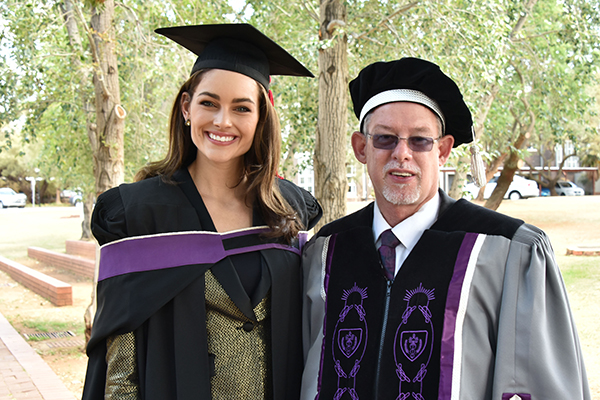
Rolene Strauss and Prof Gert van Zyl, Dean of the Faculty of Health Sciences, after
receiving her MB CHB degree during the Summer Graduation on the
Bloemfontein Campus of the University of the Free State
on 7 December.
Photo: Charl Devenish
Spotlight photo: Johan Roux
It was definitely a moment to remember when former Miss World 2014, Rolene Strauss, was among the 107 students in the Faculty of Health Sciences walking across the stage in the Callie Human Center on 7 December 2017.
Rolene, now Dr Rolene Strauss, received her MB ChB degree during the Summer Graduations at the University of the Free State (UFS). She also recited the Vow of the Graduands in Medicine during the ceremony. She resumed her studies at the UFS in 2016 after putting it on hold in 2014 when she was crowned as Miss World.
Passion for health and education
“My love for health and medicine is what got me back to studying. There were so many opportunities to be explored after my year as Miss World, but I wouldn’t have been ‘Rolene’ if I didn’t finish my medical studies. I have absolutely no regrets,” Rolene said in a statement.
“I’m a test-tube baby and I believe my passion for health was born with me,” Rolene said. This is what fostered her deep set passion for health, women, and education.
Together with her sister-in-law, Dr Ledivia Strauss, she will be launching a holistic women’s health practice in Paarl next year. Rolene will not be commencing her medical internship in 2018, as she plans on doing more public speaking engagements, finishing her book, and focusing on the medical practice.
Photo gallery:
7 December Morning session
Video:
7 December Morning session